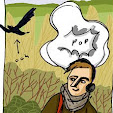The professional Twitter @mrsjeremyday might be getting more use than the personal one nowadays. Partly that's the intensification of the middle aged public sector career. You're always either in frantic catch-up or being flung around by outsourcings and restructures, or both, and there is less left over for personal life, even the tiny, interstitial bits of it. Partly it's that, like everyone else, I'm more of a visual communicator nowadays in my personal life, and as a super early-adopter (I started using it back when it was a text-message service) I never got the habit of putting pictures in my tweets.
That's OK for the professional twitter, though, because she has two pretty solid jobs to do. Number one will be familiar to most: the dreaded conference twitter-huddle, the scramble for #hashtags, the quick run-through the half-dozen other profiles tweeting, the little boom as your professional circle expands, and you get another dozen news-threads bringing you the good - or at any rate, novel - stuff. So yes, I'm one of those who suddenly messing up your trending list with an inexplicable acronym periodically.
The other job is maybe a bit more personal. Most working days include a bit of click-around, a bit of research, a bit of checking, reading, discovering. That stuff gets dissolved into the work I'm doing of course, but I also usually don't want to just close all these useful things when the light drops out of the sky and the cleaners turn up with their increasingly futuristic hoovers. Spread the joy. And so the ritual is born of the end of day tab-dump, excerpted fragments and useful diagrams dropped into my twitter stream in a tea-time splurge as I'm trying to leave the office.
Sometimes, the tab-dump allows me to pick up a fresh news perspective on something that has relevance to my work head, but another tto my home head, as I'm sliding between the two. Consider this tweet, for example:
That's OK for the professional twitter, though, because she has two pretty solid jobs to do. Number one will be familiar to most: the dreaded conference twitter-huddle, the scramble for #hashtags, the quick run-through the half-dozen other profiles tweeting, the little boom as your professional circle expands, and you get another dozen news-threads bringing you the good - or at any rate, novel - stuff. So yes, I'm one of those who suddenly messing up your trending list with an inexplicable acronym periodically.
The other job is maybe a bit more personal. Most working days include a bit of click-around, a bit of research, a bit of checking, reading, discovering. That stuff gets dissolved into the work I'm doing of course, but I also usually don't want to just close all these useful things when the light drops out of the sky and the cleaners turn up with their increasingly futuristic hoovers. Spread the joy. And so the ritual is born of the end of day tab-dump, excerpted fragments and useful diagrams dropped into my twitter stream in a tea-time splurge as I'm trying to leave the office.
Sometimes, the tab-dump allows me to pick up a fresh news perspective on something that has relevance to my work head, but another tto my home head, as I'm sliding between the two. Consider this tweet, for example:
I'd been checking out loot box information to improve our gaming and regulation advice for parents and carers, and had managed to hack through to some actual research. Almost the sweetest meat in this paper was in their limitations section, where they reflected that recruiting survey respondents via Mechanical Turk may have queered their sample. As an online piece-worker myself (I Yougov, which is lower risk and reward than Mechanical Turk, but comes with its own problems - generally a stab of guilt when I discover it commissioned to produce yet another dead cat or dog whistle for a problematic think tank) I keep an eye on the innovations in the area, and I agree with the authors of the paper. They recruited exclusively from optimistic, gambling-prone, system-gamers, and this probably did change their results, although the actual findings from this generator of headlines and policy change were modest, and in essence came down to this; a small number of adolescents are vulnerable to becoming problem gamblers, in line with adults.This interesting study finds an association between problem gambling and high spend on loot boxes in self-reported behaviour of adults recruited via Mechanical Turk https://t.co/a1sz6avFLG and also opens me up to the genre of loot box opening videos (a quick dip suffices)— Jeremy Day (@mrsjeremyday) September 23, 2019




No comments:
Post a Comment